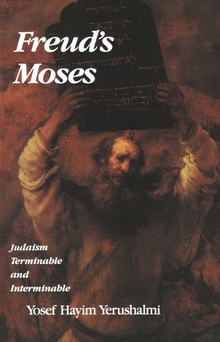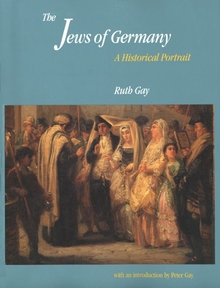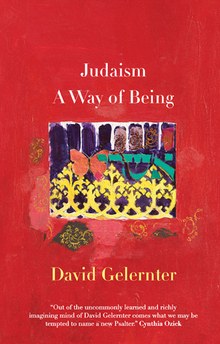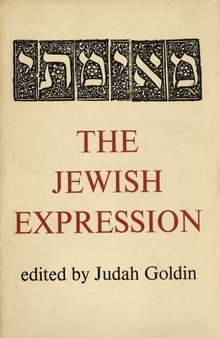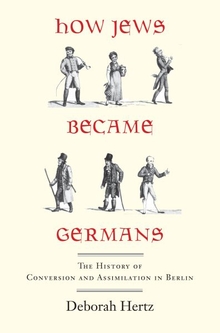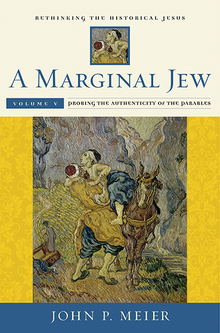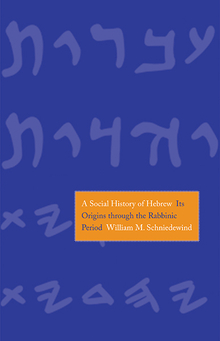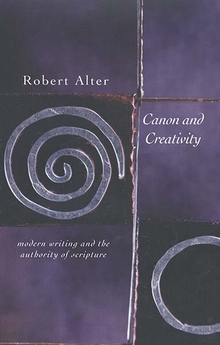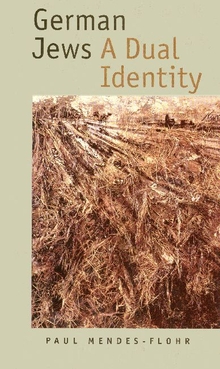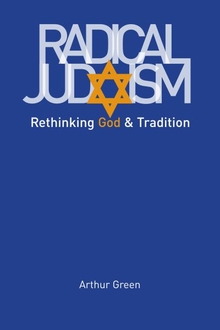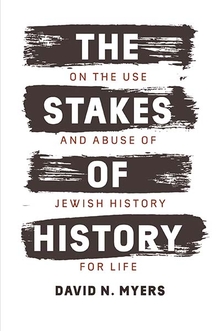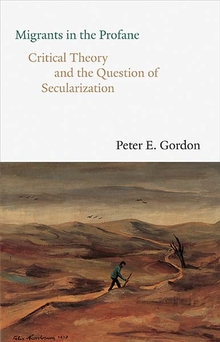Freud's Moses
WARNING
You are viewing an older version of the Yalebooks website. Please visit out new website with more updated information and a better user experience: https://www.yalebooks.com
Judaism Terminable and Interminable
Yosef Hayim Yerushalmi
Moses and Monotheism, Freud’s last major book and the only one specifically devoted to a Jewish theme, has proved to be one of the most controversial and enigmatic works in the Freudian canon. Among other things, Freud claims in the book that Moses was an Egyptian, that he derived the notion of monotheism from Egyptian concepts, and that after he introduced monotheism to the Jews he was killed by them. Since these historical and ethnographic assumptions have been generally rejected by biblical scholars, anthropologists, and historians of religion, the book has increasingly been approached psychoanalytically, as a psychological document of Freud’s inner life—of his allegedly unresolved Oedipal complex and ambivalence over his Jewish identity.
In Freud’s Moses a distinguished historian of the Jews brings a new perspective to this puzzling work. Yosef Hayim Yerushalmi argues that while attempts to psychoanalyze Freud’s text may be potentially fruitful, they must be preceded by a genuine effort to understand what Freud consciously wanted to convey to his readers. Using both historical and philological analysis, Yerushalmi offers new insights into Freud’s intentions in writing Moses and Monotheism. He presents the work as Freud’s psychoanalytic history of the Jews, Judaism, and the Jewish psyche—his attempt, under the shadow of Nazism, to discover what has made the Jews what they are. In the process Yerushalmi’s eloquent and sensitive exploration of Freud’s last work provides a reappraisal of Freud’s feelings toward anti-Semitism and the gentile world, his ambivalence about psychoanalysis as a “Jewish” science, his relationship to his father, and above all a new appreciation of the depth and intensity of Freud’s identity as a “godless Jew.”
"Yerushalmi has written a dazzlingly brilliant book. Reading it is to take an exciting journey through the spaces of mind—an adventure of intellect. This book is an extraordinary achievement, one that will be discussed and debated for many years."—Irving Howe
"Yerushalmi's scrupulously documented book gives us not only the fullest and most judicious interpretation of Freud's last detective story but recovers for us how this 'godless Jew' perceived his historical situation. Moses and Monotheism is shown to be a fable of identity that still speaks to us—a fascinating yet also tragic work that incorporates 'the Jewish romance with German civilization' from its hopeful beginning in the Enlightenment to its dark end in the Hitler years."—Geoffrey Hartman, Yale University
"Yerushalmi brings his considerable learning in psychoanalytic doctrine, Jewish history, and theology to bear on one of the central problems in understanding Freud, the question of his Jewish identity. . . . [A] fine book."—Mark Edmundson, Washington Post Book World
"Yerushalmi . . . [is] temperamentally the perfect reader for Freud. . . . Yerushalmi has satisfyingly stirred up all the undercurrents with which Freud had meant to trouble our sleep. The privilege of watching a penetrating contemporary mind engaging one of the great thinkers of the modern age results in an intellectual adventure of the first order, one not to be missed."—Phillip Lopate, Newsday
"[An] intriguing, elegantly narrated book. . . . Through it we can come to understand better Freud the man and a number of his ideas."—Robert Coles, New York Times Book Review
"[A] provocative new book. . . . [Yerushalmi's] writing . . . is impassioned and lucid; his views—on everything from the Oedipal relationship between Christianity and Judaism, to Freud's penchant for making symbolic identifications with mythical heroes—are original and occasionally brilliant. Freud's Moses is sure to provoke much spirited debate among psychoanalysts, Freud scholars and religious historians alike, and it deserves the attention of lay readers interested in these fields as well."—Michiko Kakutani, New York Times
"An elegant, suggestive, subtle examination of Freud's preoccupation with a historical figure who resembled himself in interesting ways."—New York Times Book Review
"Mr. Yerushalmi . . . brings a historian's perspective to the interpretation of Moses and Monotheism. He argues, against more psychoanalytically inclined critics, that if Freud is taken at his word on the subject of Moses and Judaism, rather than psychoanalyzed, it is possible to see his final work in a different light: not as a repudiation of his Jewish identity, but as an examination of Jewish history and what it means to be a Jew."—Ellen K. Coughlin, Chronicle of Higher Education
"In dealing with the various issues involved in the problem of Freud's Jewish identity, Yerushalmi sees 'a fully coherent development leading to Moses and Monotheism.' His account of how Freud came to write this work clarifies some of the striking contradictions between Freud's public and private statements about his Jewishness and the Jewishness of the psychoanalytic movement."—William McGrath, The New York Times Book Review
"A brief, brilliant examination of Freud's last major achievement—Moses and Monotheism—and by extension the uncanny persistence of the great thinker's attachment to Judaism."—Jonathan Rosen, Forward Books
"Freud cannot be understood without consideration of his age and his society, the brilliant achievement and conflicted existence of Jews in Central Europe before World War II. Yerushalmi discusses this background ably, as well as Freud's emotional and intellectual biography and the issue of psychoanalysis as a 'Jewish science'. Yet, the crux of the book comes . . . in the final chapter, when the author addresses his subject directly. . . . It is a dramatic, even anguished conclusion to a profound and witty book."—Judith M. Amory, Wilson Library Bulletin
"Shrewd, scrupulously researched. . . . Yerushalmi has a wonderful eye for the assemblage of prooftexts from Freud's writings and obiter dicta."—Robert Alter, Commentary
"This massively documented yet eminently readable text takes up the questions surrounding Freud's last and conventionally derided book, Moses and Monotheism."—First Things
"Rewarding reading."—Choice
"Deeply interesting and ably-argued. . . . The letters and family documents brilliantly discussed by Yerushalmi show beyond doubt Freud's deep attachment [to Judaism]."—Hyam Maccoby, Times Higher Education Supplement
"In this thoughtful, elegant, lucid, and affectionate study, Yerushalmi does Freud the honor of reading the book [Freud's Moses and Monotheism] carefully as meaning what Freud claimed it to be: a bold reconstruction of two mysteries of Western thought, namely, the rise of monotheism and the singularity of the Jews."—Volney P. Gay, Psychoanalytic Books: A Quarterly Journal of Reviews
"By way of a final tour de force we are invited to listen in on Yerushalmi's imaginary 'monologue with Freud'. . . . This final chapter constitutes a powerful, eloquent denunciation of anti-Semitic attacks on psychoanalysis as a 'Jewish science'. . . . A fascinating record of research and a substantial contribution to the literature on Freud's theories of the origins of religion."—David Maier, AJR Information (Association of Jewish Refugees in Great Britain)
"Nothing is hothouse, overspecialized, or pedantic in this portrait of Freud the Ambivalent. . . . Yerushalmi has a sense of wonder which makes for wonderful exegesis and puts jargon out of the question."—Robert Beum, The Christian Century
"Yerushalmi's scholarliness is rivaled by his originality and passionately personal style."—Dorthy M. Levinson, Books & Religion
"[A] superb study."—Donald M. Kartiganer, Congress Monthly
"An excellent exploration of the background of one of Freud's works. . . . Yerushalmi's study has become the new baseline for studies of Freud."—Sander I. Gilman, Journal of the History of Medicine
"A carefully documented book. . . . The author offers a new appreciation of Freud and an analysis of his identity as a Godless Jew."—Esther Elman Unger, Jewish Voice
"A fascinating illumination of the work and life of one of the geniuses of our age."—Academic Library Book Review
"With exquisite skill Yerushalmi follows a slim trail of psychological and textual clues to highly plausible conclusions. The result . . . is polished and persuasive."—Haim Chertok, Hadassah Magazine
"[A] highly suggestive and intelligent book . . . Yerushalmi offers an extremely original reading of Freud's text that draws significantly upon his training in classical Jewish sources as well as on his voluminous knowledge of modern Jewish history, and his mastery of the psychoanalytic material is no less impressive."—David Stern, New Republic
"Presumably Yerushalmi, who has written a book on Jewish historical memory, has in mind less the preponderance of Jews in the profession than the nature of both Judaism and psychoanalysis as unique disciplines of remembrance, but rather than expatiate on this last thought, he casts its nucleus into our minds and leaves its ripples to spread there."—Hillel Halkin, Jerusalem Report
"Yerushalmi, a gifted Jewish historian, provides a refreshing new insight into Freud's Moses. He emphasizes the importance of understanding Freud's conscious intent. In an extraordinarily well documented, concise, and psychoanalytically enriched discourse, he presents Freud's work in a positive light."—Stefan A. Pasternack, Contemporary Psychology
"A book written with a mission. It is not simply a critique of Freud's Moses and Monotheism, but rather an intriguing exploration of the author behind the work, specifically, the nature of his Jewish identity. . . . A fascinating book . . . [that] raises some important questions about the interrelationship of Freud the individual and Freud the theorist."—Judith S. Kestenberg, The Psychoanalytic Quarterly
"[Yerushalmi] provides a reappraisal of Freud's feelings toward anti-Semitism and the gentile world, his ambivalence about psychoanalysis as a 'Jewish' science, his relationship to his father, and above all a new appreciation of the depth and intensity of Freud's identity as a 'godless Jew.'"—Menorah Review
"In Freud's Moses, the historian Yosef Yerushalmi once again confirms his vocation as one of our generation's most original and formidable, yet sweetly engaging, wielders of the critical imagination. His approach to Freud—his exhilarating skill in uncovering, stratum by stratum, the often neglected sources of Freud's conceptual intuition—will be controversial only to those who conceive of genius as wholly abstracted from the imperatives of memory and inheritance. If you have ever supposed that Kafka 'transcends' his Jewish wellspring, and that Freud does the same, then Professor Yerushalmi's illuminating reexaminations will startle you into richer complexities and insights far more nuanced."—Cynthia Ozick
Publication Date: July 28, 1993

